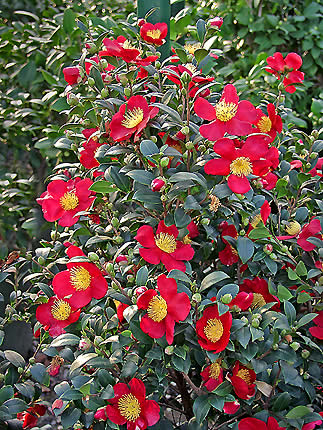Yuletide Camellia Sasanqua |
|
|
Theaceae Camellia Sasanqua Yuletide |
|
| Price |
|
| Availability and Options |
3 Gallon In StockOther Options: 
|
| Shipping Information |
Cannot ship to: Alaska, Hawaii
|
| Grows In | Zone 7A · 0° to 5° F through Zone 10B · 35° to 40° F |
| Sun Exposure | Morning Sun / Evening Shade, Dappled Light / Filtered Sun |
| Soil Drainage | Well Drained |
| Resistent To | Heat |
| Blooms | Fall Blooms, Winter Blooms |
| Foliage Color | Blue Green |
| Average Height | 8' to 10' |
| Average Width | 8' to 10' |
| Attracts | Visual Attention |
| Fragrances | None |
Camellia Sasanqua 'Yuletide' is a moderate growing shrub that can be grown in USDA Plant Hardiness Zones 7A through 10B. It matures to an average height of 8 feet to 10 feet and an average width of 8 feet to 10 feet, depending on climate and other environmental factors. It prefers growing in a location that provides morning sun with afternoon shade or filtered sun and grows best when planted in loam or clay soil that is well drained. The foliage is blue green in color. It attracts visual attention and is resistant to heat.
Yuletide Camellia can be useful in the landscape in foundation plantings, as a buffer or screen, as a background, in shrub borders, as a focal point, in landscape beds or islands, grown flat against a wall, as a hedge or as a tree form shrub and also in theme gardens or shade gardens.
 More About Yuletide Camellia...
More About Yuletide Camellia...Noteworthy Characteristics
Yuletide is one of the all-time favorite camellias among the Sasanqua varieties....and for very good reason! In late fall to mid winter, this evergreen shrub or small tree produces brilliant, fiery red blooms centered with bright yellow stamens. Blossoms stand out in high contrast against glossy, dark green foliage.
Uses
Yuletide Camellia has many uses. As a shrub, it can be used as a specimen or in straight or curved rows to form attractive, evergreen hedges and screens. It can also be "limbed up" to form a very attractive small tree placed in small groupings or as a focal point specimen. It is perfect for use as espalier: trained to grow flat against a wall.
Culture
Camellias prefer a fertile, moist but well-drained, acidic soil. Constantly soggy soil is a slow killer. Your new camellia should not need regular watering after the first year unless there are extended periods of dry weather during summer. Camellias do best in partial shade or filtered sun. Avoid afternoon direct sun.
How To Plant A Camellia Shrub
How To Prune A Camellia Plant
How To Fertilize A Camellia Plant
USDA Zones: 8A-10B
Species: Sasanqua (Fall to Mid Winter Blooming)
Bloom Color: Bright Red with Bright Yellow Stamens
Bloom Size: 3-4 inches
Bloom Form: Single
Bloom Season: Fall to Mid Winter
Maintainable Height: 6-10 feet
Maintainable Width: 5-8 feet
Growth Habit: Upright, Dense
Light Preferences: Filtered shade to light sun
Plant Uses: Hedge, Buffer, Screen, Small Tree, Landscape Beds, Flowering Shrub Borders, Small Groupings, Specimen, Foundation Plant, Espalier, Large Containers
I have to say I've ordered some very leggy camellias but this Yuletide is bushy, healthy, and was pruned just before shipping. As I'm in Zone 6 I hope to keep this Yuletide as a potted tree to bring indoors in winter but based on this tree I will hopefully order some outdoor camellia next spring I can plant and leave outside.
Hi John - Thanks so much for taking the time to provide your feedback and a review of your experience with GardenerDirects and the plants you purchased. It will be very helpful and appreciated by future visitors to the site. Let us know if there's ever anything else we can help you with. We're at your service!
Beautiful plant. Arrived in excellent packaging. Already planted. Waiting to see how it grows.
Hi Vishal - Thanks for the compliments! It's best to plant Camellias where they will get morning to early afternoon sun with shade or filtered light during the afternoon. Plant them in well-drained soils. During the first growing season, water only enough to keep the soil damp, but not soggy. As with many other types of plants, constantly soggy soil can be a killer of Camellia.